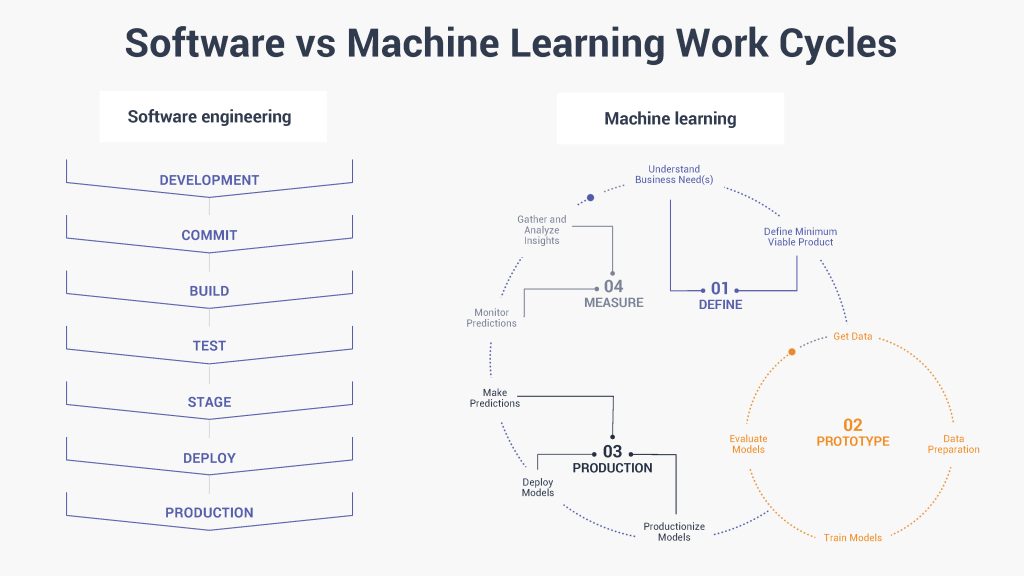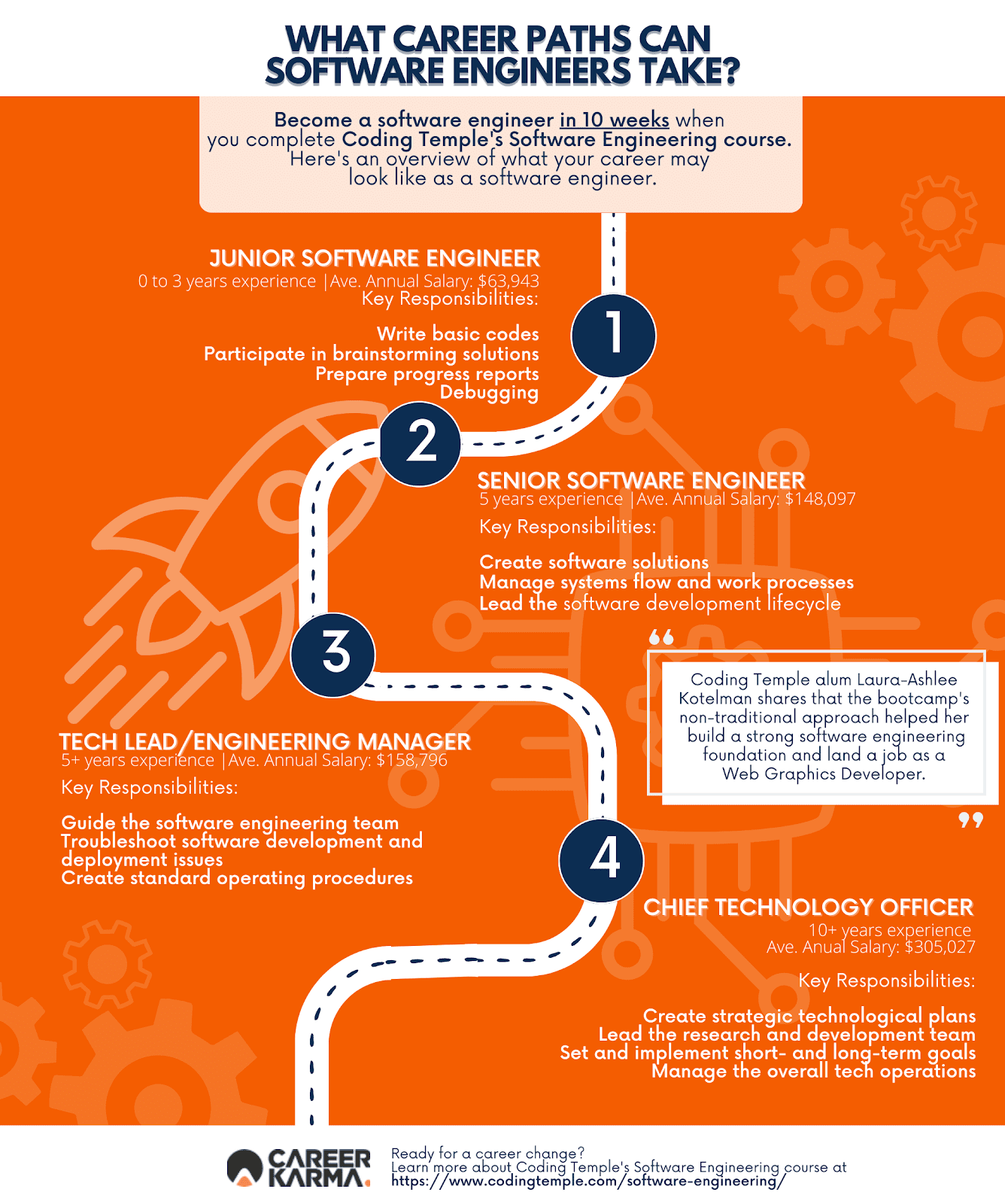All Categories
Featured
Table of Contents
- – Facts About Machine Learning In A Nutshell For...
- – All About Machine Learning Bootcamp: Build An ...
- – 7-step Guide To Become A Machine Learning Eng...
- – No Code Ai And Machine Learning: Building Dat...
- – Machine Learning Engineers:requirements - Va...
- – 19 Machine Learning Bootcamps & Classes To K...
- – Machine Learning Can Be Fun For Everyone
Some people believe that that's dishonesty. If somebody else did it, I'm going to use what that individual did. I'm requiring myself to think with the possible options.
Dig a little bit deeper in the math at the start, simply so I can develop that foundation. Santiago: Lastly, lesson number seven. I do not think that you have to understand the nuts and bolts of every algorithm before you use it.
I have actually been utilizing semantic networks for the longest time. I do have a feeling of just how the gradient descent functions. I can not describe it to you now. I would need to go and check back to really get a far better intuition. That does not indicate that I can not resolve points utilizing neural networks, right? (29:05) Santiago: Trying to require people to believe "Well, you're not mosting likely to be successful unless you can explain each and every single information of exactly how this functions." It goes back to our sorting instance I think that's just bullshit suggestions.
As an engineer, I have actually serviced many, several systems and I have actually utilized numerous, many things that I do not recognize the nuts and bolts of just how it functions, despite the fact that I comprehend the influence that they have. That's the final lesson on that particular string. Alexey: The funny thing is when I believe about all these libraries like Scikit-Learn the formulas they utilize inside to carry out, for example, logistic regression or another thing, are not the very same as the algorithms we study in artificial intelligence courses.
Facts About Machine Learning In A Nutshell For Software Engineers Uncovered
Even if we tried to discover to obtain all these fundamentals of equipment understanding, at the end, the formulas that these collections use are different. ? (30:22) Santiago: Yeah, absolutely. I think we need a whole lot more pragmatism in the market. Make a great deal more of an impact. Or focusing on supplying worth and a little much less of purism.

By the way, there are 2 various paths. I typically talk to those that want to operate in the industry that intend to have their impact there. There is a course for scientists and that is totally various. I do not dare to speak concerning that since I do not know.
Right there outside, in the industry, pragmatism goes a long means for certain. (32:13) Alexey: We had a remark that claimed "Really feels even more like inspirational speech than speaking about transitioning." Maybe we need to switch over. (32:40) Santiago: There you go, yeah. (32:48) Alexey: It is an excellent motivational speech.
All About Machine Learning Bootcamp: Build An Ml Portfolio
One of the points I wanted to ask you. Initially, allow's cover a pair of things. Alexey: Allow's start with core tools and frameworks that you require to discover to in fact transition.
I know Java. I recognize exactly how to make use of Git. Perhaps I understand Docker.
Santiago: Yeah, definitely. I think, number one, you should start learning a little bit of Python. Considering that you already know Java, I don't think it's going to be a huge change for you.
Not due to the fact that Python is the very same as Java, yet in a week, you're gon na get a whole lot of the differences there. Santiago: After that you obtain specific core tools that are going to be made use of throughout your entire career.
7-step Guide To Become A Machine Learning Engineer In ... - Questions
That's a library on Pandas for information adjustment. And Matplotlib and Seaborn and Plotly. Those three, or one of those three, for charting and displaying graphics. Then you obtain SciKit Learn for the collection of maker knowing algorithms. Those are devices that you're going to have to be using. I do not suggest simply going and discovering concerning them out of the blue.
Take one of those training courses that are going to start presenting you to some problems and to some core concepts of equipment learning. I don't keep in mind the name, yet if you go to Kaggle, they have tutorials there for free.
What's good concerning it is that the only demand for you is to recognize Python. They're mosting likely to offer a trouble and tell you how to make use of choice trees to address that details trouble. I think that procedure is exceptionally effective, due to the fact that you go from no device finding out background, to understanding what the problem is and why you can not resolve it with what you recognize right now, which is straight software program design methods.
No Code Ai And Machine Learning: Building Data Science ... for Beginners
On the various other hand, ML designers concentrate on building and releasing artificial intelligence designs. They concentrate on training models with data to make forecasts or automate tasks. While there is overlap, AI engineers deal with even more diverse AI applications, while ML designers have a narrower concentrate on artificial intelligence formulas and their practical execution.

Maker knowing engineers concentrate on creating and deploying maker learning models into production systems. They deal with engineering, making sure designs are scalable, reliable, and incorporated into applications. On the other hand, information scientists have a broader function that includes data collection, cleansing, exploration, and building versions. They are frequently accountable for extracting understandings and making data-driven choices.
As companies significantly adopt AI and maker understanding innovations, the need for experienced professionals expands. Equipment discovering engineers work on cutting-edge tasks, add to innovation, and have competitive wages.
ML is basically various from traditional software program growth as it concentrates on teaching computer systems to learn from information, as opposed to programming specific guidelines that are performed methodically. Uncertainty of outcomes: You are most likely utilized to composing code with foreseeable outcomes, whether your function runs when or a thousand times. In ML, nonetheless, the results are much less specific.

Pre-training and fine-tuning: Just how these versions are educated on substantial datasets and after that fine-tuned for particular tasks. Applications of LLMs: Such as text generation, sentiment evaluation and info search and retrieval.
Machine Learning Engineers:requirements - Vault - The Facts
The capacity to take care of codebases, merge changes, and solve disputes is equally as important in ML growth as it is in standard software program tasks. The skills developed in debugging and screening software applications are extremely transferable. While the context might transform from debugging application logic to determining problems in data processing or model training the underlying concepts of organized investigation, hypothesis screening, and repetitive improvement coincide.
Artificial intelligence, at its core, is heavily dependent on data and chance theory. These are vital for recognizing exactly how algorithms gain from information, make predictions, and review their performance. You ought to think about becoming comfy with principles like statistical relevance, distributions, hypothesis testing, and Bayesian thinking in order to design and translate versions effectively.
For those thinking about LLMs, a detailed understanding of deep knowing designs is beneficial. This includes not just the technicians of semantic networks however likewise the design of particular versions for different use situations, like CNNs (Convolutional Neural Networks) for image processing and RNNs (Reoccurring Neural Networks) and transformers for consecutive information and all-natural language handling.
You must be mindful of these issues and find out methods for recognizing, alleviating, and connecting about prejudice in ML models. This consists of the potential effect of automated decisions and the honest effects. Numerous designs, specifically LLMs, call for substantial computational resources that are typically supplied by cloud platforms like AWS, Google Cloud, and Azure.
Structure these skills will not only assist in a successful change into ML yet also ensure that developers can contribute efficiently and responsibly to the advancement of this dynamic field. Concept is necessary, yet absolutely nothing beats hands-on experience. Begin servicing projects that enable you to apply what you've learned in a sensible context.
Take part in competitors: Join platforms like Kaggle to get involved in NLP competitors. Construct your tasks: Begin with straightforward applications, such as a chatbot or a message summarization device, and slowly boost complexity. The area of ML and LLMs is swiftly advancing, with brand-new developments and innovations emerging consistently. Staying upgraded with the current research and trends is crucial.
19 Machine Learning Bootcamps & Classes To Know Can Be Fun For Everyone
Sign up with areas and online forums, such as Reddit's r/MachineLearning or area Slack networks, to talk about ideas and obtain recommendations. Participate in workshops, meetups, and conferences to attach with other specialists in the area. Contribute to open-source tasks or create article concerning your learning trip and tasks. As you acquire expertise, begin searching for opportunities to include ML and LLMs into your work, or seek brand-new roles concentrated on these technologies.

Vectors, matrices, and their duty in ML algorithms. Terms like version, dataset, features, labels, training, inference, and validation. Information collection, preprocessing techniques, version training, analysis processes, and deployment considerations.
Decision Trees and Random Woodlands: User-friendly and interpretable designs. Matching trouble kinds with proper models. Feedforward Networks, Convolutional Neural Networks (CNNs), Frequent Neural Networks (RNNs).
Continual Integration/Continuous Deployment (CI/CD) for ML process. Model tracking, versioning, and performance monitoring. Identifying and dealing with adjustments in design performance over time.
Machine Learning Can Be Fun For Everyone

Training course OverviewMachine knowing is the future for the future generation of software application professionals. This training course serves as an overview to maker knowing for software program engineers. You'll be presented to three of the most relevant elements of the AI/ML technique; monitored knowing, semantic networks, and deep discovering. You'll realize the distinctions in between traditional programs and artificial intelligence by hands-on advancement in supervised knowing before developing out intricate distributed applications with neural networks.
This program functions as a guide to maker lear ... Program Extra.
Table of Contents
- – Facts About Machine Learning In A Nutshell For...
- – All About Machine Learning Bootcamp: Build An ...
- – 7-step Guide To Become A Machine Learning Eng...
- – No Code Ai And Machine Learning: Building Dat...
- – Machine Learning Engineers:requirements - Va...
- – 19 Machine Learning Bootcamps & Classes To K...
- – Machine Learning Can Be Fun For Everyone
Latest Posts
Software Engineer Interview Guide – Mastering Data Structures & Algorithms
Data Science Vs. Data Engineering Interviews – Key Differences
Interview Strategies For Entry-level Software Engineers
More
Latest Posts
Software Engineer Interview Guide – Mastering Data Structures & Algorithms
Data Science Vs. Data Engineering Interviews – Key Differences
Interview Strategies For Entry-level Software Engineers